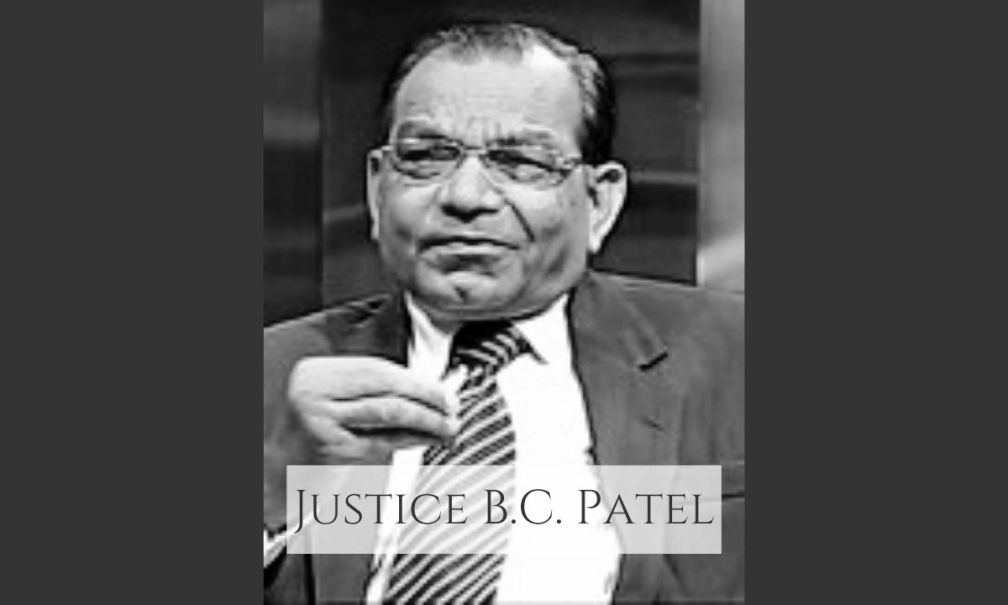Former Judge at Delhi High Court
NAME – Babulal Chandulal Patel
PROFESSION– Judge
BORN – 7th August 1943
PLACE OF BIRTH – Ahmedabad, Gujarat, India
FATHER’S NAME – N/A
MOTHER’S NAME – N/A
SPOUSE – N/A
SIBLINGS -N/A
CHILDREN – N/A
EDUCATION – B.A (Hons) in Economics, L.L.B degree and M.A Degree in Economics and Politics from Gujarat University, 1967.
AWARDS – N/A
B. C. Patel was a former Chief Justice of Delhi High Court and a celebrated jurist.
SPECIALISATION – Civil Law
COMMITTEE/PANEL HEADED– N/A
BACKGROUND – From the time he became an advocate in the City Civil Court of Ahmedabad, back in 1968, B.C Patel has been in the legal profession for a long and effective time.
UPBRINGING and EDUCATION – He has received his LLB degree from Gujarat University along with a M.A in economics and Politics from the same after which he made his way on the legal path.
WALK OF LIFE AS JURIST/ JUDGE– B.C. Patel became an advocate in 1968 and started his practice as an advocate in the City Civil Court of Ahmedabad. He then joined the chamber of a well-known advocate, Late Mr. H.K Thakore who worked as a criminal advocate. In 1981, he started practicing independently in the High Court of Gujarat and other various courts where he represented the Gujarat Electricity Board for 10 years. He practiced civil, criminal and constitutional cases. In 2002, he became the
Acting Chief Justice of Gujarat High Court and was then elevated to the position of the Chief Justice of the High Court in Jammu and Kashmir. In 2003, he was then appointed as the Chief Justice of Delhi High Court. Along with practicing as
an advocate, he hosts a keen interest in education and has taught as a professor of
law in many colleges over the span of 15 years.
CAREER TIMELINE –
1968- Enrolled as an Advocate and started practice in the City Civil Court,Ahmedabad.
1970- Began Practice in the Gujarat High Court. Joined the practice of the renowned criminal side advocate, Mr. H.K Thakore and assisted him in many important session’s cases and criminal appeals.
1981- Started independent practice as an advocate in the Gujarat High Court by practicing in matters of civil, criminal and constitutional. He represented Gujarat Electricity Board and at the same time worked as a professor of law in various
colleges.
1990- He was appointed as a permanent judge in the bench of Gujarat High Court where he passed many landmark judgements related to town planning and building activities in the urban areas.
2002- He was the Acting Chief Justice of Gujarat High Court and then within the next three months of this he was elevated to the position of Chief Justice in the High Court of Jammu and Kashmir.
2003- From being the Chief Justice in the Jammu and Kashmir High Court he was elevated to the position of the Chief Justice of the Delhi High Court.
2005- Retired as the Chief Justice of Delhi High Court.
LAND MARK JUDGEMENTS –
Delhi Transport Corporation vs Mrs. Meena Chaturvedi And Ors. on 29 April, 2005-
The case was heard by a three-judge bench that comprised on B.C Patel, S K Kaul and B D Ahmed. It was regarding the legal question of whether the payment of benefit such as pension is required to be reduced from the total compensation amount payable or not. It was an important judgement written by B.C Patel because the same matter had been heard by two different high courts and had reached conflicting results in both. After studying both the judgements passed prior and hearing the case again the Delhi high court declared that the consideration of the payment of damages or in the case the compensation to the person should be done and provided for the loss.
Latif Chhmtumiya Shaikh vs State of Gujarat on 21 July, 2000–
The case was heard by a three-judge bench, consisting of B. C Patel, R Abichandani and M Calla. The case had 4 legal question posing in front of the court. They were-
i. Whether the High Court can grant bail or parole or furlough to a convict that is accused of an offence under the Narcotic Drugs and Psychotropic Substances Act during pendency of an appeal against the conviction and sentence or after that?
ii. Whether the High Court can exercise its writ jurisdiction under Article 226 and 227 of the Constitution of India in relation to Question 1 (mentioned above)?
iii. Whether the High Court can exercise its writ jurisdiction and suspend the sentence of an accused convicted under TADA?
iv. Can High Court direct release on parole a convict undergoing sentenceimposed by the competent court when an appeal arising out of said judgement of conviction and sentence is pending?
The Court, while holding that the applicant is facing threat to his life on account of fatal disease for which treatment can’t be made available to him in jail, stated that “we are born for justice and justice is the supreme purpose for which we exist.” The petition was disposed of accordingly.
CONTROVERSIES – N/A
REMARKABLE ACHIEVEMENT– N/A

